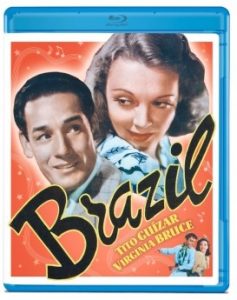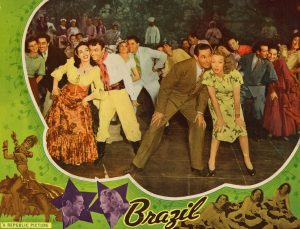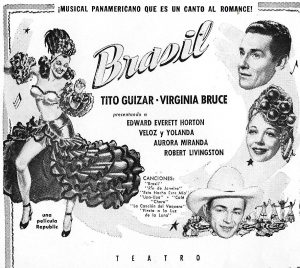I can’t say that I’m much of an authority on musicals, but this week marks the high definition debut of a movie that includes a few noteworthy numbers. Brazil aka Stars and Guitars is a Republic Pictures entry that sought to complete with big studio fare. And to some degree, it succeeded. In fact, the movie ended up nominated for three Academy Awards, including Best Song (“Rio de Janeiro”), Best Original Score and Best Sound Recording.
 Yet, despite being considered for several Oscars, it quickly faded away after its original release. Eventually, it popped up briefly on VHS before disappearing once again. In fact, it was even difficult for me to find press photos for this article. So, it’s superb that Olive Films have managed to find and salvage the movie, cleaning it up with an excellent transfer and saving it from potentially being lost forever.
Yet, despite being considered for several Oscars, it quickly faded away after its original release. Eventually, it popped up briefly on VHS before disappearing once again. In fact, it was even difficult for me to find press photos for this article. So, it’s superb that Olive Films have managed to find and salvage the movie, cleaning it up with an excellent transfer and saving it from potentially being lost forever.
Obviously, this tale was created to capitalize on the success of high-budget studio musicals like Holiday Inn (1942), Yankee Doodle Dandy (1942), Going My Way (1944), Meet Me in St. Louis (1944) and many others. Still, it does have a few things going for it. Namely, its famous title tune that no doubt inspired the entire film. The song “Brazil” was written in 1939 and took a couple of years to catch on, but by the early 40s was a huge hit worldwide and it must have been a big coup to secure the rights. Film fans will likely remember it from Terry Gilliam’s cult flick Brazil (1985) – the entire score is based on this particular melody.
 The really goofy story involves a travel writer named Nicky Henderson (Virginia Bruce), who arrives in Rio and immediately crosses paths with famed songwriter Miguel Soares (Tito Guizar), who is working on a composition for a song competition at Rio Carnival. She wants to see the “real” Brazil and Miguel immediately falls for her, despite Nicky’s somewhat dismissive personality. Soares neglects to tell her about his actual career and instead poses as a tour guide. He takes her to small and authentic Rio locales like.. a viewing area for the Christ the Redeemer statue.
The really goofy story involves a travel writer named Nicky Henderson (Virginia Bruce), who arrives in Rio and immediately crosses paths with famed songwriter Miguel Soares (Tito Guizar), who is working on a composition for a song competition at Rio Carnival. She wants to see the “real” Brazil and Miguel immediately falls for her, despite Nicky’s somewhat dismissive personality. Soares neglects to tell her about his actual career and instead poses as a tour guide. He takes her to small and authentic Rio locales like.. a viewing area for the Christ the Redeemer statue.
Things hit a snag when Miguel’s pal Everett (Edward Everett Horton) informs him that Nicky has written a snotty book on the men of Brazil called “Why Marry a Latin”. Miguel doesn’t really seem disturbed by this. Instead, the protagonist enacts a plan to get Nicky to fall in love with him by inventing a charming twin brother (with the exact same name) who only speaks Portuguese. He appears riding and singing on horseback, gestures to her about his songwriting skills and uses pure charisma to eventually win her heart. Why the elaborate ruse? Who knows?
 Miguel doesn’t get a whole lot of competition from romantic rival and US Embassy employee Rod (Robert Livingston). In fact, Rod may be the laziest suitor in cinematic history, simply standing by and watching with a smile while Miguel sings to and woos Nicky. It’s nice that the character is so affable, but it doesn’t result in much (actually, any) tension or potential for comic conflict.
Miguel doesn’t get a whole lot of competition from romantic rival and US Embassy employee Rod (Robert Livingston). In fact, Rod may be the laziest suitor in cinematic history, simply standing by and watching with a smile while Miguel sings to and woos Nicky. It’s nice that the character is so affable, but it doesn’t result in much (actually, any) tension or potential for comic conflict.
Guizar is a likable performer and is clearly a singer by trade, but he isn’t the strongest actor. And most will be scratching their heads as to why he is so enamored with Nicky. As for the plot, it is by the numbers stuff. And it’s pretty obvious that the filmmakers and production never left their Los Angeles soundstages at any point to shoot their tribute to the South American country.
 At least there is plenty of music and few impressive song and dance numbers to liven things up. Even though “Rio de Janeiro” was nominated for an Oscar (Going My Way‘s “Swinging on a Star” ultimately won), the title song is the most memorable and it is lively orchestrated with dancers early in the film. There’s also an impressive recreation of the Carnival towards the end, packed full of partying and dancing extras. An out-of-the-blue and otherwise completely random appearance by Roy Rogers (who sings a song in full cowboy garb and then leaves) is also amusing.
At least there is plenty of music and few impressive song and dance numbers to liven things up. Even though “Rio de Janeiro” was nominated for an Oscar (Going My Way‘s “Swinging on a Star” ultimately won), the title song is the most memorable and it is lively orchestrated with dancers early in the film. There’s also an impressive recreation of the Carnival towards the end, packed full of partying and dancing extras. An out-of-the-blue and otherwise completely random appearance by Roy Rogers (who sings a song in full cowboy garb and then leaves) is also amusing.
As mentioned, the disc looks great. The picture and sound quality is very strong, making this by far the best the movie has ever looked since it played in cinemas 72 years ago. Even if Brazil is no masterpiece as a narrative, the music is above average and the film looks and sounds great on Blu-ray. Fans of old-fashioned musicals may get a kick out of it.


